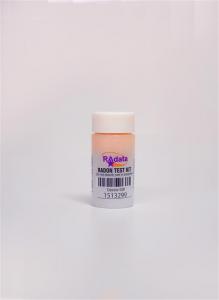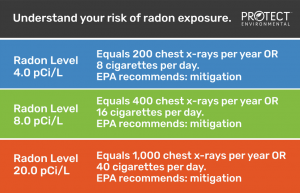Ways to Promote Healthy Communities & Prevent Radon-Induced Lung Cancer During National Public Health Week
To support National Public Health Week, Protect Environmental provides increased access to radon testing to prevent leading cause of environmental cancer deaths
“Inhaling cancer-causing air is not a choice people knowingly make. Unfortunately, too many people don’t know they should test until they receive a devastating lung cancer diagnosis,” said Kyle Hoylman, chief executive officer of Protect Environmental. “Our mission to create healthy, safe, and sustainable indoor environments in the places we live, work, and learn aligns with many public health goals but more awareness and radon testing is required to save lives.”
Elevated levels of cancer-causing radon have been identified in every state and any building is at risk. The good news is exposure is preventable but much of the country remains dangerously undertested. Radon-induced lung cancer is estimated to cost nearly 6 billion dollars in annual medical costs and claim the lives of at least 21,000 Americans each year. Much of the cost burden is carried by taxpayers through Medicaid and Medicare making this a key public health issue that continues to fly under the radar.
“Everyone deserves a healthy and safe living space. That is why we are doing our part by offering free radon test kits to homeowners nationwide to increase access to testing and create healthier neighborhoods across the country,” said Chris Ferguson, director of products and laboratory operations at Protect Environmental.
Radon is a radioactive gas released as Uranium decays underground. Radon can enter buildings through gaps, cracks, and crevices in the foundation of a building and can accumulate to dangerous levels indoors. The only way to know if the occupants of a building are at risk of radon exposure is to test. The EPA recommends testing for radon every two years as geological and environmental factors can cause radon levels to fluctuate. If elevated levels are found, radon exposure can be limited with effective, efficient, and economical mitigation methods.
Steps to prevent radon-induced lung cancer:
1. Test. To increase access to testing nationwide, the American Lung Association and Protect Environmental have partnered1 with RAdata Analytical Lab to provide free radon test kits to homeowners.
2. Fix. If there is an issue, indoor radon can be reduced with cost-effective mitigation systems. Do your research and choose a radon professional that is licensed and certified. In the communities Protect Environmental currently serves, financing is available through GreenSky.
3. Explore. To better understand the radon risk in your community, use the Protect Environmental National Radon Risk Search™ tool.3
4. Share. Testing for radon saves lives. Share this message and these testing opportunities with your loved ones, your community, and your neighbors. Follow Protect Environmental on social media and use the hashtag #PublicHealthWeek to help prevent lung cancer. Help educate kids about radon with free downloadable and printable radon coloring pages.
Andrea Stephens
Protect Environmental
+1 502-649-6870
nationaladmin@protectenvironmental.com
Visit us on social media:
Facebook
Twitter
LinkedIn
Instagram
YouTube
TikTok
1 https://www.protectenvironmental.com/protect-environmental-and-the-american-lung-association-announce-national-partnership-to-prevent-radon-induced-lung-cancer/
2 https://www.freeradontestkit.com/?utm_source=earned+media&utm_campaign=Free+Radon+Test+Kit
3 https://www.protectenvironmental.com/average-radon-test-results-by-zip-code/



